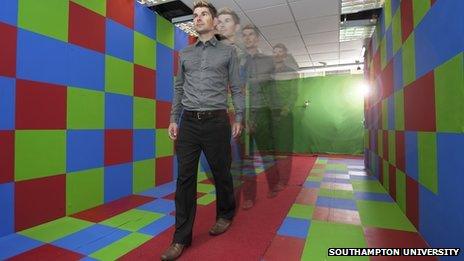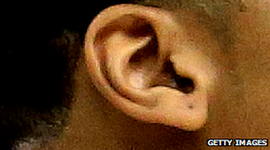Biometrics cybersecurity research gets government cash
- Published

Twelve cameras capture the gait of individual subjects as they walk down the biometric tunnel at the University of Southampton.
A cybersecurity research centre is being launched at the University of Southampton.
It is one of eight universities to have secured a government grant to focus on the discipline.
Cybersecurity covers bank and border security as well as protecting national infrastructure like the power grid.
Southampton will use part of the cash to extend its study of biometrics - the identification of people by their biological characteristics.
Cybercrime is getting worse, experts claim.
"It's very easy to be a cybercriminal if you want to be," said Vladimiro Sassone, director of the Cyber Security Centre of Excellence at the university.
He said software was now readily available to help to carry out computer-controlled attacks.
"Attempts to tear down national infrastructures of entire countries are actually happening."
He added that illegal efforts ranged from large-scale attacks on transport and financial systems to attempts to steal private information from individuals.
"How do you assess cyber risks?" he asked.
Biometric apps use voice or facial recognition as a security check
"Why are people on the internet behaving as if they were sitting in the living room when in fact they are out there in the wilderness?
"A lot can be done by educating people. But this is a complex field - there are other things that are so far above the heads of the end-user."
Eye contact
The University of Southampton's work will build on existing research into biometrics.
Face and iris recognition tools are already in use. The academics suggest analysing the way people walk and the shape of their ears could be the basis of future tests.
Prof Mark Nixon believes that a person's gait and ears are as unique as their fingerprints, adding that they are harder to fake than more traditional forms of identification.
He has built a biometric tunnel in his lab at the University of Southampton. It contains 12 cameras which measure a person's gait as they walk along it and take pictures of their ears.
The tunnel is brightly coloured to optimise the contrast between the subject's clothing and background, making it easier for the researchers to capture a 3D image as they walk.
"It's normal television technology - chroma key," he said referring to the green-screen backgrounds used to superimpose people against separately filmed scenes.
"Nobody would be seen dead in a bright green suit, or a bright blue suit, or a bright red suit.
"We haven't tested it on 60 million people yet but the results are very encouraging."
No two people have yet been found to have the same results, and so far far nobody has been able to replicate somebody else's gait to the extent that it fooled the computer, Professor Nixon said.

We may be able to prove our identity by having our ear's scanned by computers in the future
Gait-analysis recently helped police deduce that a series of crimes were being carried out by the same man, who had disguised his identity by wearing a bike helmet, he added.
But he noted that other countries had been faster than Britain to adopt biometrics in day-to-day life.
"In Japan something like 40% of ATM terminals use finger vein technology," he said. "It recognises you by the pattern of blood vessels in your finger."
"But it's early days and it takes people a while to become happy with new technology."
Centres of Excellence
Southampton, Bristol, Lancaster, Oxford and London universities, Imperial College London, Queens University Belfast and University College London have all been named Centres of Academic Excellence by the government's cybersecurity scheme which includes intelligence division GCHQ and the Department for Business and Skills.
As part of their status, they have each been given an investment grant of £50,000.
"We want to make the UK one of the most secure places in the world to do business, by investing in the best expertise to keep pace with technological change," said cybersecurity Minister Francis Maude.
"These first eight centres will play a vital role in boosting research, expanding our cyber-skills base and fostering innovation in the field."
- Published20 September 2012
- Published13 November 2012
- Published26 July 2012
- Published15 May 2012